
Contents

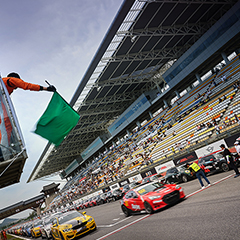
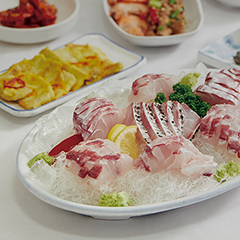


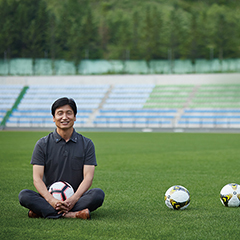

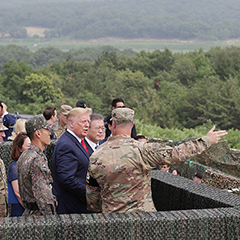
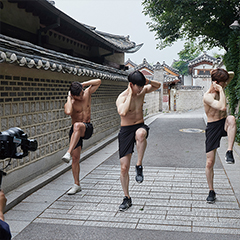

People · Written by Park Jina Photographed by Studio Kenn
Almost Pitch Perfect
U-20 Men’s Soccer Coach
Chung Jungyong, coach of the national under-20 (U-20) men’s soccer team, made history on June 15
in Poland by leading Korea to the final of the FIFA U-20 World Cup. Though his squad lost to Ukraine,
3-1, their finish was the highest by a Korean men’s team in a FIFA world tournament and came after
another runner-up finish in the Asian Football Confederation U-19 Championship on Nov. 4 last year.
The success of his coaching style seems to lie in his communication-based management approach and
emphasis on constant player improvement.

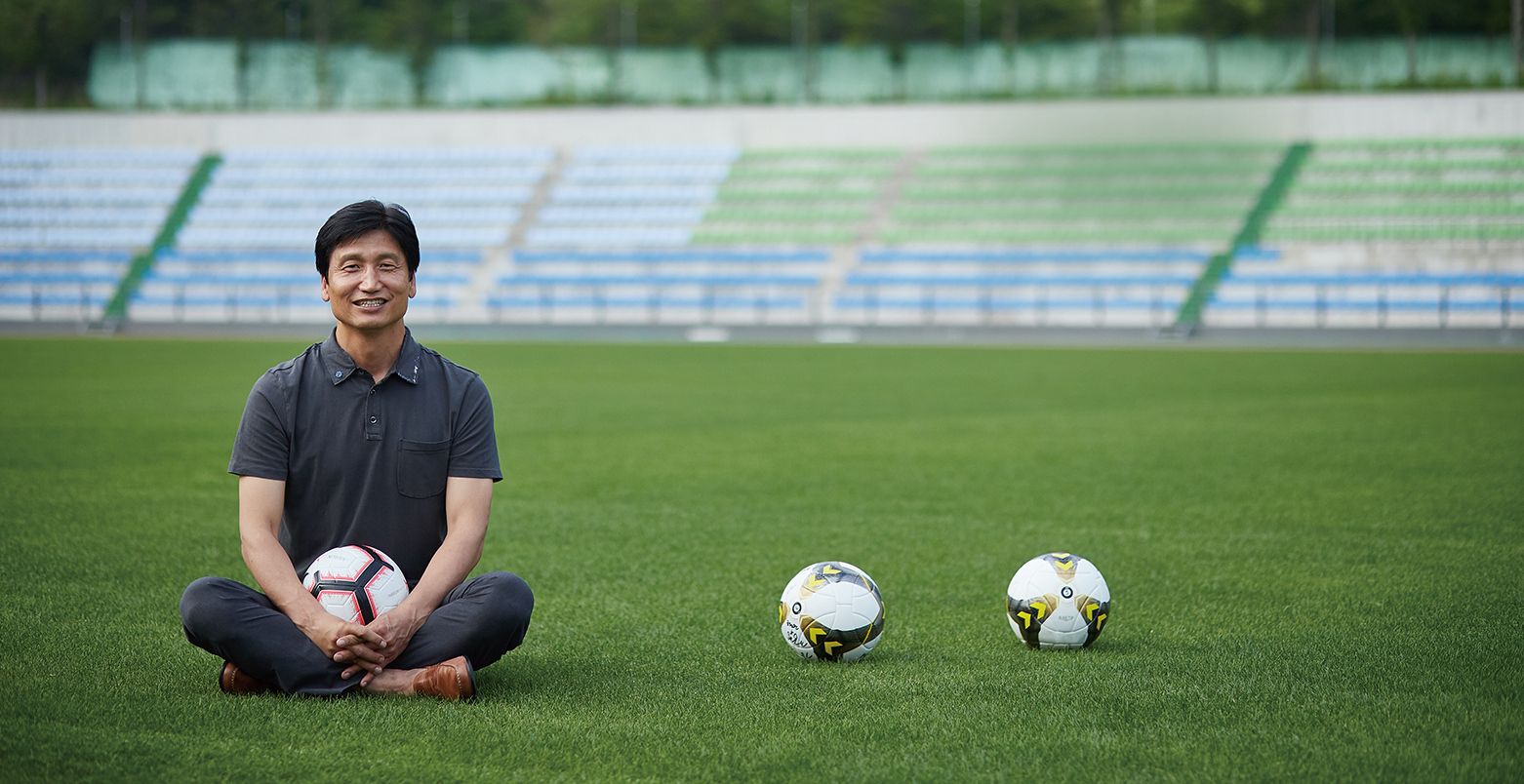
In 1983, the national under-20 men’s soccer team made the semifinals of the FIFA U-20 World Cup. This year, Korea lost to Ukraine, 3-1, in the tournament final but earned praise for its surprising run. The slogan “Again 1983” and the Taegeuk Warriors’ self-proclaimed nickname “the team that never gives up” inspired them to achieve the country’s highest finish in a men’s FIFA world tournament.
Korea got no breaks in the event after its placement in the competitive Group F along with pre-tournament favorites Argentina and Portugal. In the knockout round, coach Chung Jungyong’s young guns faced archrival Japan in a game that fueled both concern and anticipation at the same time. Chung called this match a milestone for Korea in the tournament, saying, “The (group) match with Senegal was the most intense for sure, but I think the round of 16 game was the most important that changed things for us. Once we passed the group stage, the pressure of competing in the knockout round appeared, especially since we faced Japan. The game itself was also quite challenging but after we won, our sense of reward doubled to lift our team spirit. Thus this game was essentially a milestone in our team’s reorganization and maturation.”
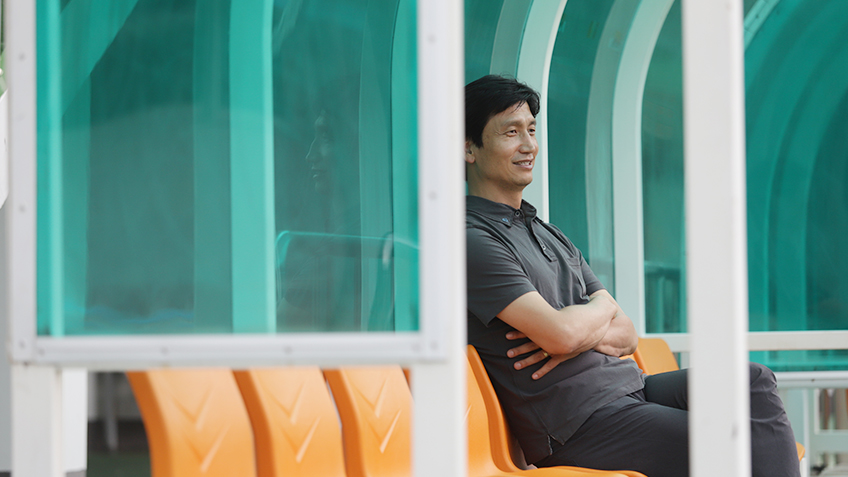
Communication-based Leadership
The runner-up finish in the U-20 tournament was not the only highlight of the team’s run. The coach promoted a “one team” philosophy of teamwork through his “lead-by-example” management style. Chung said he first does what he wants his players to do before telling them. “I’ve long thought of what makes a good leader. Being a good role model is a huge aspect of leadership,” he said, adding that he developed his brand of leadership through his experiences. He prioritizes open communication with players and stresses to them that they should always strive to improve and be willing to learn.
“We wouldn’t be able to understand each other if all I do is to criticize players. But when I ask them why some things don’t work out, they give me answers and I respect where they’re coming from. This is real communication. I’m never fond of an environment in which players are uncomfortable with their coach and try avoiding him. After two years of working together, the team and I thankfully don’t have this issue. My own rule is to stay flexible off the field but strict on it when it comes to technical things players must learn or improve on. Everyone makes mistakes, but all it takes is to teach them how to avoid making such mistakes. But if they’re unwilling to learn and continue making the same mistakes, I hold them accountable.”
Chung said his players know and mostly agree with his principles, but that this is a double-edged sword. “Players usually do what leaders tell them to do without question but I’d rather that they think critically and ask why. If they say they understand when they don’t, the ensuing miscommunication and misunderstanding cause them to lose their confidence,” he said.
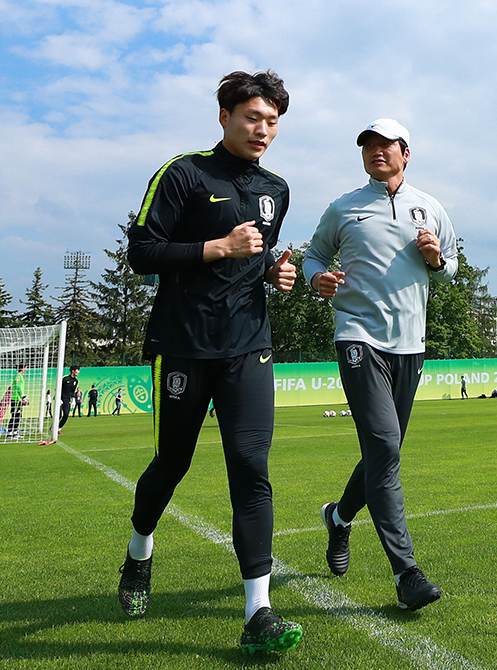 Chung’s soft leadership prioritizing communication led the team to a runner-up finish. © Yonhap News
Chung’s soft leadership prioritizing communication led the team to a runner-up finish. © Yonhap News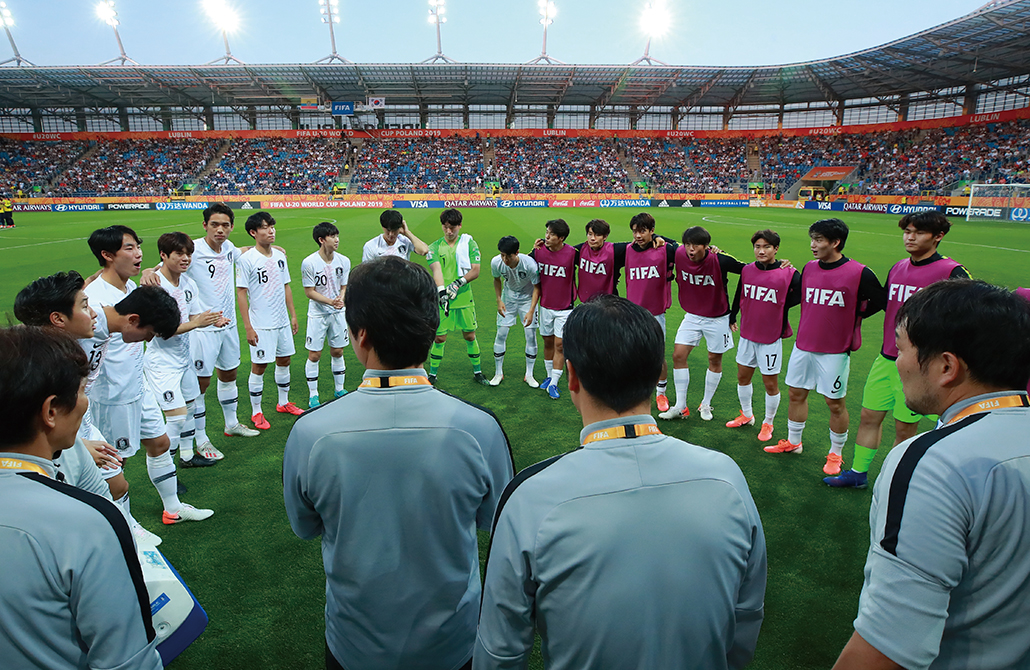 The under-20 (U-20) men’s soccer team and its coach Chung Jungyong prepare for the U-20 World Cup semifinal with other coaching staff. © Yonhap News
The under-20 (U-20) men’s soccer team and its coach Chung Jungyong prepare for the U-20 World Cup semifinal with other coaching staff. © Yonhap NewsFondness for Youth Teams
Chung’s playing career abruptly ended as he retired at the young age of 29. He then started a new path in coaching and developed his leadership skills after entering the Korea Football Association (KFA). “The reason I joined the KFA was to quickly learn soccer trends and get the opportunity to go abroad and broaden my perspective. My job was to coach the youth team. It’s been 10 years since we won our first tournament at the U-14 Asian Youth Games in 2009. At the time, one reporter wrote an article about me titled ‘Youth Team Is My Destiny.’”
Chung went on to coach Daegu FC of the domestic pro league K-League 1 and other teams at the national level (including under 17 and 23), but he said his most satisfying performances always came from coaching youth. For youth teams, he said he stresses training focused on enhancing individual skills. Though this strategy does not always yield tangible results, he said he feels more rewarded and responsible in bringing out each player’s potential and helping him develop.
On the most important element to compete on the global stage, Chung mentioned a winning mentality, saying, “In Europe, players naturally pick up a winning mentality during training but our youth players rarely have that opportunity. I think training players to stay physically strong or enhancing concentration on the ball can make this happen. A winning mentality is something more sustainable than just preparing for a specific game and should be instilled in any team for any game. I believe that if we can cultivate this kind of environment, Korean soccer teams will have a bright future.”
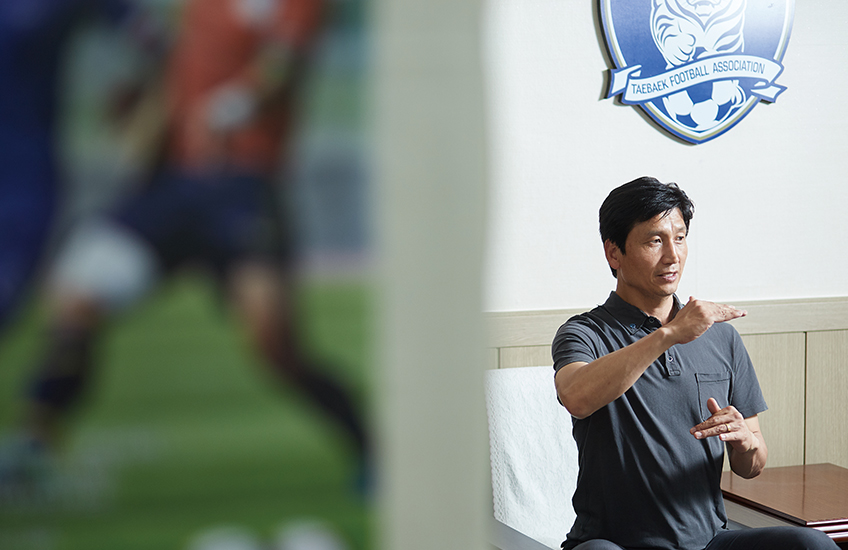
Coach Chung Jungyong has led Korea to the finals of two major tournaments: the 2018 Asian Football Confederation U-19 Championship and the 2019 U-20 World Cup.
Final Thoughts
Since his U-20 success, Chung continues to do what he does best:develop youth players. Now watching the National Tournament for university players, in Taebaek, Gangwon-do Province, he said he has a message for both active and aspiring players.
“More than a thousand players are active in the tournament I’m watching. Fewer than 1% of them will make it to the national team. I was one of the 99% who couldn’t make it. Even so, I want to encourage players to enjoy the game, have fun and protect themselves. If you have a specific goal, do your best to attain it. Prepare yourself and the result will speak for itself. Even if you don’t make the national team, there are a lot of other things you can do.”
Chung said his busy schedule after the U-20 World Cup gave him no time to ponder his future. Yet as a KFA coach, he said his duty is to find and foster youth players. “Selecting and supporting youth players are certainly important tasks that require a strong sense of responsibility to perform. That’s why I’m watching this game in Taebaek now. So this is my priority, but if given the chance, though it seems intimidating, I want to take on a new challenge one day,” he said.
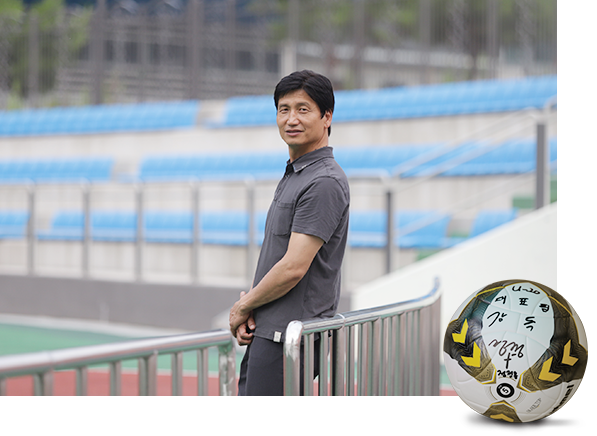
Coaching Profile
Chung Jungyong
- 2019
- Runner-up at FIFA U-20 World Cup
- 2018
- Runner-up at AFC U-19 Championship
- 2011
- Winner at Toyota International Youth Football Championship
- 2009
- Winner of soccer tournament at U-14 Asian Youth Games
Other Articles















